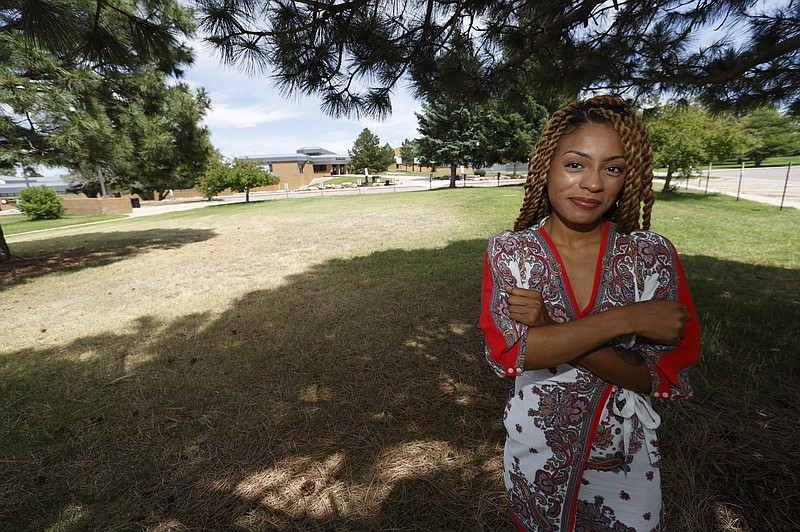DENVER -- School districts nationwide are working to remove police officers from campuses, but some Black and Indigenous educational leaders are resisting the push prompted by the national reckoning over racial injustice and police brutality.
Some say the system is hamstrung by a complicated mix of police response policies and a lack of support for alternative programs, which plays a role in students of color being disproportionately punished and arrested -- the so-called school-to-prison pipeline. Some support individual officers skilled at working with students. Others say they need to learn more as activists urge change.
Cities from Portland, Ore., to Denver to Madison, Wis., have taken steps to remove police from schools after George Floyd's death at the hands of Minneapolis police. But some school leaders like Stacy Parrish, principal of Northeast Early College in Denver, said school resource officers are being unfairly blamed for students of color ending up in the criminal justice system.
Parrish, a member of the Klamath Tribes, said she supports the movement to combat overpolicing but believes it's irresponsible to eliminate school resource officers and replace them with counselors and social workers without changing the overall approach to discipline.
"Generalizations and romanticizations aren't getting us anywhere when our democracy needs our public schools more than ever," Parrish said.
The problem lies in the tangle of state laws and school policies that mandate when police respond -- such as a student suspected of selling drugs -- and a lack of money for alternative ways of helping troubled students, she said. School policy in Denver requires overworked counselors to take students to court if they repeatedly miss class, while drug treatment programs are underfunded but a better solution for students who bring drugs to school, Parrish said.
SCHOOL BOARDS TORN
Some school officials have rejected activists' demands to cancel police contracts. Chicago's school board left the decision to local councils comprising mostly parents.
Kenwood Academy, a predominantly Black public school near the University of Chicago, has two officers who focus on protecting students from problems like shootings or domestic disputes between parents on campus, Principal Karen Calloway said.
She said one officer stopped dismissal after learning of a nearby shooting last year, and many parents thanked her for the swift action.
"That, to me, was worth the money that we spend on school resource officers alone," Calloway said.
The officers, who the local council this month voted to keep, can't discipline students, she said.
In San Francisco, the school board voted in June not to renew its agreement with police before getting a recommendation from its African American Parent Advisory Council. In a letter to the board, the group said it was divided: Some saw school resource officers as the only positive relationship between police and schools.
"Members of our Leadership Team have been vocal at previous Board of Education meetings, asking that an opportunity be created to widely hear the voices of the Black community," the letter said. "To our knowledge, that has not been done."
The council is planning a town-hall-style meeting to discuss police in schools but said a more pressing concern could be how teachers and staffers can get police involved in disciplinary issues that are supposed to be off-limits to police and disproportionately push Black students out of school. It noted that 35% of students suspended in the 2017-18 school year were Black, though they make up only 6% of the population in the San Francisco Unified School District.
The district didn't immediately respond to a request for comment.
Latoya Pitcher, who's on the Black parents council, said she's hopeful those supporting equity won't implement knee-jerk solutions to address the embarrassment that comes with exposing systemic racism.
"I am grateful that SFUSD today has a progressive board that fights against all '-isms,'" she said.
'COLLATERAL DAMAGE'
In Denver, Kevin Wilson, who oversees student discipline at the Collegiate Prep Academy, a mostly Black and Hispanic school, said he supports the movement to overhaul policing. Wilson, who is Black, had difficulties with police growing up in the neighborhood where he now works, but he thinks school officers have unfairly become "collateral damage" in the movement.
Because his school has no officer, he said he'll sometimes ask a Black and bilingual officer from a nearby school to meet with particularly recalcitrant students. The officer often will work with the student instead of writing a ticket, Wilson said.
"That is what our community needs," he said.
Denver Public Schools board member Tay Anderson, who pushed to end the contract with police, said he would like school resource officers to remain a specialized unit within the Police Department but go to schools only when called.
Creating a new security plan will involve looking at changes to the discipline policy, Anderson said. And the district's roughly 1,500 employees are getting implicit bias training to try to prevent students of color from being disciplined more harshly.
Another district in the Denver area has kept its officers but also has more funding for mental health support, which can help prevent students from getting in trouble with the law.
Aurora Public Schools gets about $10 million a year for mental health staffers and programs from a voter-approved tax. The district has worked out an agreement with Aurora police, who are under scrutiny for last year's death of Black 23-year-old Elijah McClain, to delineate which issues fall to police and which to educators. The number of students referred to police since 2011 has declined by 62%, including the proportion of Black students.
School board President Kyla Armstrong-Romero, who also oversees Colorado's juvenile detention facilities, believes trained school resource officers can help keep children out of the criminal justice system. However, districts also need to hire diverse teachers and train staffers to try to understand students from different backgrounds, she said.








